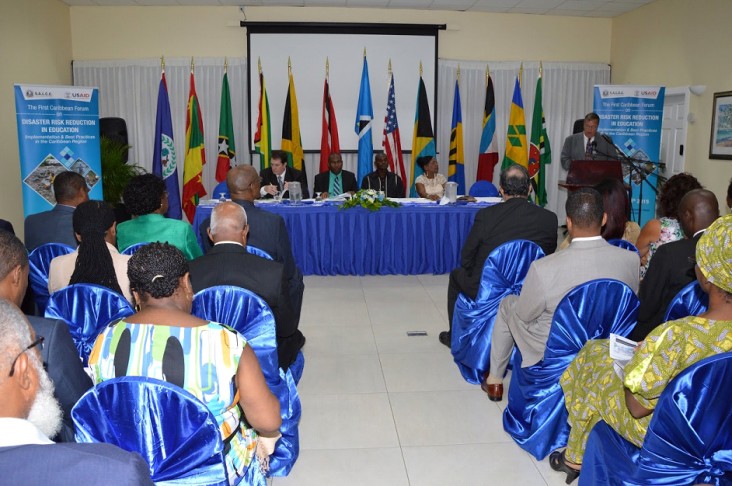
For Immediate Release
The United States Agency for International Development (USAID) is working to ensure that Disaster Risk Reduction (DRR) is incorporated into the region’s education sector. Last year, USAID directed more than US$24.5 million towards DRR in the region.
On October 12-15, USAID sponsored an inaugural Caribbean forum on DRR in Education at the St. Lucia Bay Gardens Hotel. Co-sponsored by the Sir Arthur Lewis Community College (SALCC), the theme was “Implementation and Best Practices in the Caribbean Region.” The forum focused on DRR and management within the context of special, early childhood, and higher education.
The conference attracted representatives from the Ministries of Education of 10 countries in the region, including the Minister of Education for St. Lucia; leading regional and international policy makers; researchers; and academics. The forum created opportunities for networking and sharing best practices.
Chairperson of the Board of Governors of SALCC Ms. Fortuna Husbands Anthony said the relevance and timeliness of the forum was critical: “This year we have wept with our sister country Dominica and only last week the devastation and loss of life in the Bahamas brought home the message that, as a people, we must be educated on DRR. In my humble opinion, our schools, along with other agencies, must be at the forefront to educate all the citizenry.”
Christopher Cushing, Mission Director for USAID Eastern and Southern Caribbean, underscored the importance of including DRR within the educational sector to foster an effective response. “Education plays a critical role in fostering a culture of Disaster Risk Reduction. Spreading the message of disaster preparedness and risk reduction within schools, universities, and at the community level will help prepare individuals for the risks they face.”
Cushing lauded educators for their contribution and emphasized the inherent strength and resilience of the region’s education sector with regard to natural disasters. He also praised the sector’s ability to withstand exogenous factors such as drugs and violence.
Providing insight into USAID’s efforts to date, Regional Advisor for USAID’s Office of Foreign Disaster Assistance for Latin America and the Caribbean Sidney Velado said that the Agency has addressed DDR in education for the past 15 years through a School Safety Course. The course provides teachers and other staff with the concepts and tools necessary to reduce disaster risks and produce emergency preparedness and response plans for their schools. He highlighted the importance of sound planning and professional training to equip educators with the requisite knowledge to effectively address DRR.
In addition to expert plenary presentations and working group sessions, the 3-day meeting had 10 panels that addressed financing DRR in education, building resilience to DRR at the early childhood development level, and community involvement in DRR in education.







Comment
Make a general inquiry or suggest an improvement.